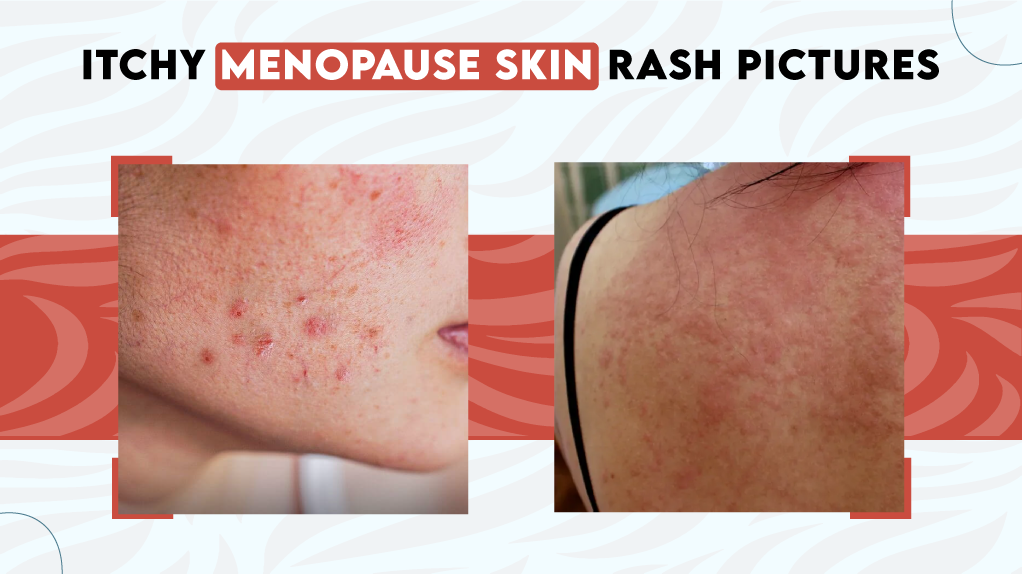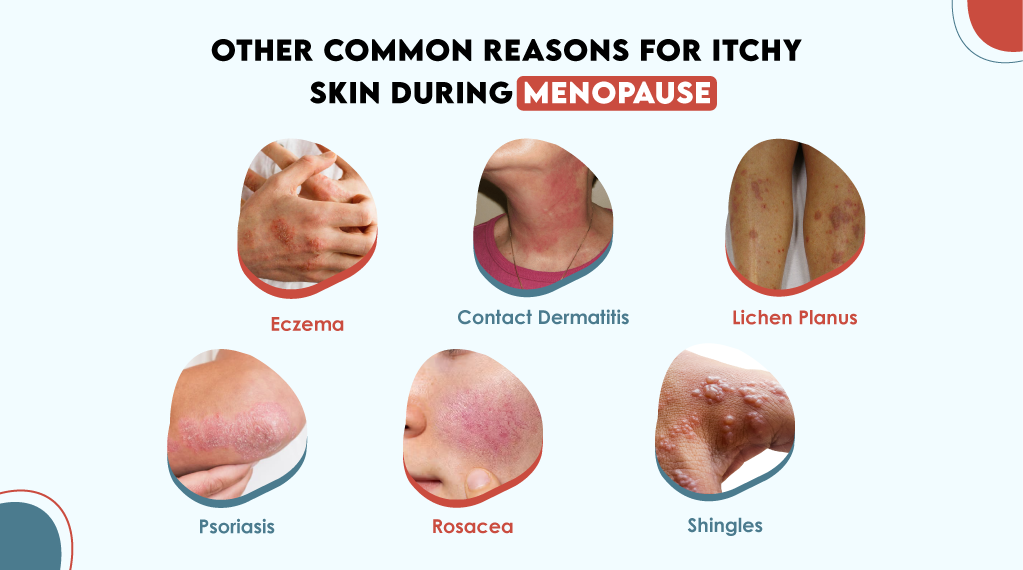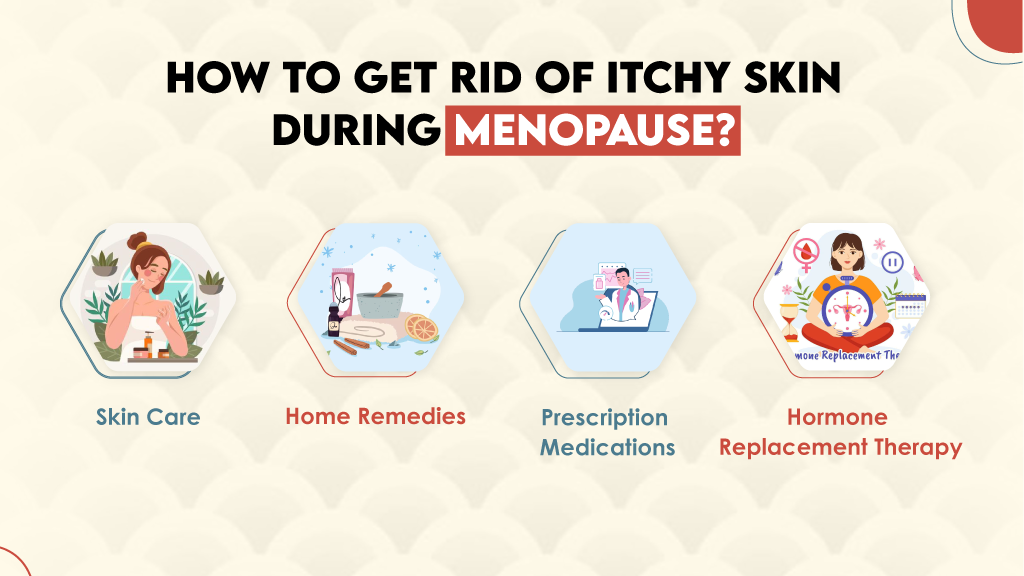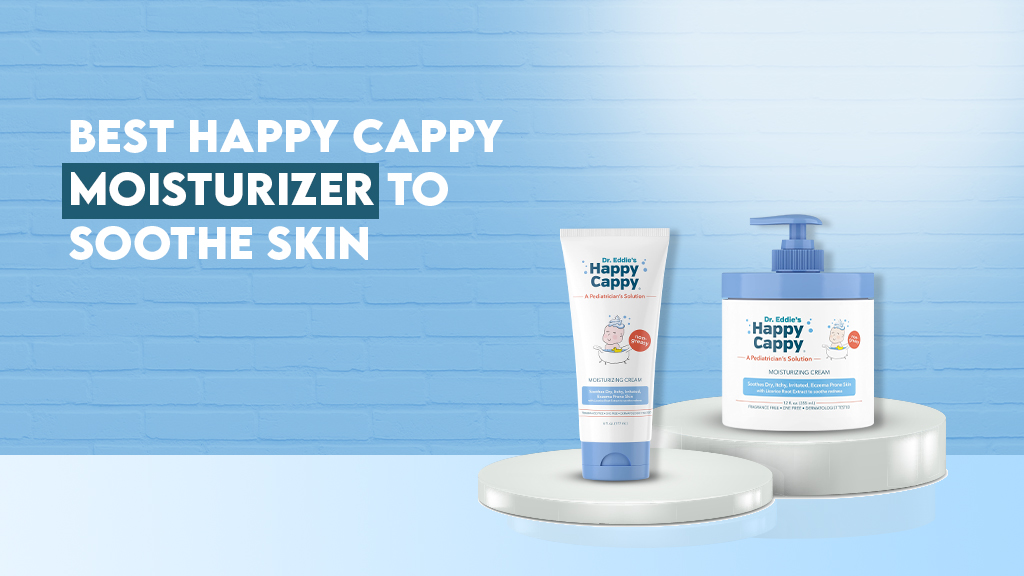
Itchy skin is something that can be experienced at any time and at any age. However, some people may experience more severe itching than others, for example people who have dry skin or skin conditions like eczema, contact dermatitis, or ringworm.
Menopause is another condition that is often linked with itchy skin. But does menopause cause itchy skin? Read this blog to discover the connection between menopause and itching.
What is Menopause?
Menopause is a natural process that women above the age of 45 experience. It usually happens at the age of 52 but may vary from person to person. It is when the ovaries of a woman stop producing reproductive hormones and menstruation ends.
During natural menopause, the body goes through three phases
- Premenopause: It begins around 8 to 10 years before the menstruation stops. During this period, the ovaries gradually produce less estrogen.
- Menopause: This is the period when your body has gone without periods for 12 consecutive months and the ovaries stop producing estrogen or releasing any eggs.
- Postmenopause: The period after menopause for the rest of your life is known as postmenopause.
Hormonal changes in the body during menopause can cause a range of skin issues and complications in the body. Some common symptoms you may experience during menopause are hot flashes, flushing, facial hair growth, and night sweats.
Can Menopause Cause Itchy Skin?
If you have been wondering “Can menopause make you itchy?” The answer is ‘Yes’. Menopause and itchy skin often go hand in hand. Many women complain that even though they have never faced severe itching before, they are now suddenly experiencing consistent itching because of menopause.
Itchy skin during menopause is medically known as pruritus. It is caused due to the reduction of estrogen in the body which can lead to itchy dry skin.
Itchy Menopause Skin Rash Pictures

The itching in menopause can sometimes be so intense that it can lead to red rashes on the skin. Especially if you have scratched your skin or have not been taking proper care of it. Here is a picture of menopause skin rash–skin that has recently been scratched or picked at.
What Causes Itchy Skin in Menopause?
Now the question arises what causes itchy skin during menopause? Here are some of the most common causes of menopausal itching:
Reduced Estrogen
Estrogen is a type of hormone in our body that plays an essential role in the development of the reproductive system in females.
Another prominent responsibility of estrogen is that it helps keep the skin hydrated by enhancing the quantity and quality of lipids in the skin known as ceramides, this improves water retention of the skin by protecting it against excessive water loss–also known as Transepidermal Water Loss (TEWL).
Thus, during menopause, a decline in estrogens can lead to a loss of moisture in the skin leaving it dry and itchy.
Less Collagen production
A drop in the estrogen levels in the body during premenopause and menopause can also affect collagen production in the body. Collagen is a type of protein present in our body that works as a primary building block of our skin.
Collagen provides strength, structure, and elasticity to the skin, and promotes the growth of new skin cells. A reduction in the production of collagen in the skin can cause wrinkles, dryness, and itchy and irritated skin.
Types of Itching During Menopause

People may experience different types of itching during menopause. Some may experience only one type while others may have to deal with both of these types.
Skin Itching
Skin itching during menopause is quite common, and is likely due to declining levels of estrogen in the body. While some people may experience mild itching others may experience a tingling sensation, prickling, and even numbness of the skin along with the itch.
This condition in medical terms is known as paresthesia. The most severe type of paresthesia can cause the sensation of insects crawling under your skin. If you are experiencing severe itching during menopause it is best to consult a doctor for the right treatment plan.
Genital Itching
Reduced estrogen in the body can also cause complications in the genital area, such as drying out of the vaginal tissues and making them thinner. This scenario can cause itching and pain in the vaginal area, which is also known as vulvar pruritus.
A physician may prescribe certain topical medications to soothe the genital itching.
Other Common Reasons for Itchy Skin During Menopause

Now we know that itchy skin is a common symptom of menopause. It is essential to understand that sometimes it may only cause mild itching that you would hardly notice. However, some other factors or skin conditions might be exacerbating that itch.
Some of the most common ones are:
- Eczema
Eczema also commonly known as atopic dermatitis is a chronic skin condition that can disrupt the skin barrier and lead to redness, itching, and dryness on the skin. The symptoms associated with eczema can become severe during a flare-up.
However, they can be easily soothed by keeping the skin clean with an eczema shampoo and body wash and keeping the skin moisturized as much as possible with an eczema cream.
- Contact Dermatitis
Contact dermatitis is a type of eczema. It can cause itching, irritation, rashes, and blisters on the skin when it comes in contact with a certain allergen or irritant. These allergens may not be harmful to you in general but your body considers them harmful and reacts by causing these symptoms.
- Lichen Planus
Lichen Planus or LP is a chronic inflammatory condition that can cause swelling, itching, and irritation on the skin along with bumps, blisters, and scales. Antihistamines and hydrocortisone cream are often prescribed to soothe itching associated with it.
- Psoriasis
Psoriasis is an autoimmune disorder that causes thick, white, or silvery patches of skin. These scaly patches can sometimes cause itching and irritation.
- Rosacea
Rosacea is very common among middle-aged and older adults. It is a chronic skin condition that can lead to itching, redness, and rashes on the skin. It is often confused with eczema however, it can cause visible blood vessels on the skin, especially on the face which is not a symptom of eczema.
- Shingles
This is a painful rash that is caused by a virus known as varicella-zoster virus, it is the same virus that causes chickenpox. These rashes can cause intense itching and blisters and bumps to appear that eventually scab over.
If your itching is intense or you are experiencing other symptoms such as blisters, bumps, and scaly patches of skin then it is best to consult a doctor to figure out if it is solely menopause as the cause or if something else as well that is making you itch so much.
How to Get Rid of Itchy Skin During Menopause?

Menopause itchy skin can be treated in different ways. Sometimes you can get rid of it by making a few lifestyle changes while for severe cases you may need to take prescription medications.
Skin Care
- Cleansing:
Keep your skin clean with a gentle daily cleanser. Cleansing or washing the skin with it once daily can help remove harmful bacteria, dirt, and buildup on the skin that can cause other complications such as skin infections, and exacerbate the itch.
- Exfoliating:
This is controversial with dry skin. It is best to consult your dermatologist for this one.
Make sure not to use chemical exfoliators as they can be harmful for itchy, sensitive skin.
- Moisturizing:
This is the most essential step in a skincare routine for itchy, dry skin. Moisturize your skin at least twice daily with a non-greasy, fast-absorbing hypoallergenic moisturizer. The best moisturizer for itchy menopausal skin is one that contains natural ingredients like licorice root extract and glycerin and is free from any skin-irritating chemicals.
Home Remedies
A few home remedies can also help soothe the itchy menopausal skin, such as:
- Cold Compress
Applying a cool compress to the itchy area can help soothe the intensity of the itching. This can be very helpful for itchy skin at night; you can place a cool wet towel on your skin to relieve the itching and help you sleep.
Colloidal oatmeal is available as an over-the-counter product which can be added to water. Taking a bath in that water can help soothe the skin and the itching.
- Avoid Irritants
Harsh chemicals in the skin care products especially the shampoo and moisturizers can strip away natural oils from the skin and make the condition worse. So use skincare products that are free from skin-irritating chemicals such as fragrances, parabens, sulfates, alcohol, and artificial dyes.
Also, use a fragrance-free detergent to wash your clothes to avoid irritation.
- Vitamin C
Adding vitamin C to your skincare routine or diet can help with collagen production in the skin and soothe itching and irritation. You can do this by eating fruits that are rich in vitamin C or taking oral supplements.
However, make sure to consult a doctor before taking any supplements to avoid complications.
- Bathing Routine
Make sure that the water you are using to take a bath is lukewarm and not hot as it can worsen the condition. Use a mild fragrance-free body wash to take your bath. Also, pat dry your skin instead of rubbing, and don’t forget to moisturize the skin immediately after a bath.
- Avoid Scratching
It can be difficult to avoid scratching the itchy skin. However, you must remember that scratching can further damage your skin and even lead to skin scaring and infections.
- Sun Protection
As your skin becomes thin during menopause it also becomes more sensitive towards UV rays. This is why it is essential to use sunscreen to protect your skin before going out. Avoid spending excessive time in direct sunlight.
- Stay Hydrated
Hydrating your body on the inside is as important as on the outside. Drink plenty of water daily to prevent dehydration.
Prescription Medications
In some cases the itching may persist even after ensuring a proper skincare regimen. Menopause itchy skin creams may include OTC steroid creams, such as 1% hydrocortisone. It can be applied directly to the skin to soothe the itching and inflammation.
An anesthetic creams such as lidocaine cream is also available OTC for intense itching. These creams numb the skin to provide temporary relief from intense itching. Antihistamines are another type of cream that is prescribed, these soothe itching by blocking the histamines in the affected area that are causing the reaction or itching.
The medications listed above are available as over-the-counter products. Using them for a long period of time can damage the skin and cause other side effects, so it is best to follow the Drug Facts label and consult your doctor if symptoms are not improving.
Hormone Replacement Therapy
Hormone replacement therapy (HRT) also known as menopausal hormone therapy is a treatment used to soothe the symptoms of menopause. In this treatment modality, the hormones such as estrogens and progesterone that are diminished are replaced or added back with the treatment.
This treatment is available in the form of pills, gels, injections, implants, and patches. However, there are also some risks of taking this treatment, some people may experience side effects such as nausea, sore breasts, or fluid retention.

How Long Does Menopausal Itching Lasts?
The answer to this question is a little complicated. Menopause itchy skin can last for years if left untreated, as it may start during the premenopause period. However, if proper care and treatment are provided to the skin you can alleviate the discomfort and soothe the itching associated with menopause.
Conclusion
Itchy skin is a common symptom that many women experience during menopause. It is caused by a lack of estrogen in the body that lowers the production of collagen and ceramides (leading to skin moisture loss) which leads to dry, irritated, itchy skin.
Sometimes menopausal itchy skin may become worse due to certain skin conditions like eczema, contact dermatitis, rosacea, and psoriasis. You can consult a doctor to confirm if the itching is caused by menopause or something else.
Itchy skin can be soothed by making a few lifestyle changes such as regularly cleansing the skin, keeping it moisturized, staying hydrated, and avoiding the irritants.
However, if the itching is severe you can consult a doctor for prescription medications or hormone replacement therapy to soothe the itching.
If you are searching for a skin-soothing moisturizer shop, Happy Cappy Moisturizing Cream is pediatrician-developed, and dermatologist-tested, free from skin-irritating chemicals, and safe to be used for all ages and skin types.
FAQs
Does menopause cause itching all over the body?
Yes, itchy skin is a common symptom of menopause. The itching can be experienced all over the body or in a specific area. The hormonal changes in the body and reduced estrogen during menopause can cause issues with the skin and itching is a common problem.
Which antihistamine is best for menopausal itching?
Cetirizine can help with the itching, however, you must consult a doctor before using any medications as they can have side effects on some individuals.
What helps itching during menopause?
Keeping the skin hydrated and moisturized with a daily moisturizing cream can help soothe the menopausal itching, for severe itching, the doctor may prescribe the use of topical medications and anti-itch creams.
What is the best cream for menopause itchy skin?
A moisturizing cream that is free from harsh chemicals like fragrance, sulfate, paraben, dyes, and phthalates, such as Happy Cappy Moisturizing Cream contains natural ingredients like licorice root extract and glycerin that help protect and restore the skin barrier. It is an excellent cream for menopause itching.
